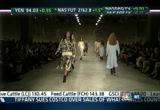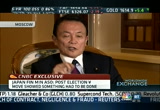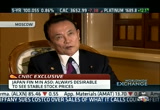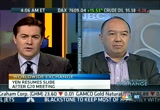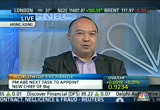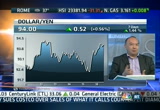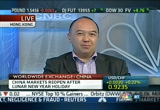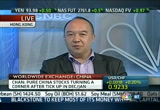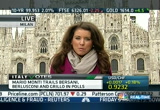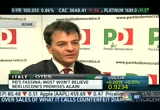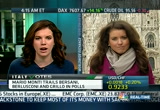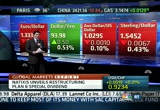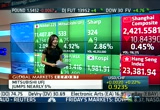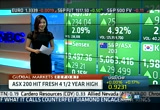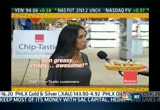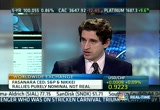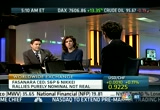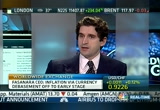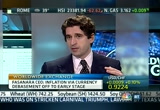tv Worldwide Exchange CNBC February 18, 2013 4:00am-6:00am EST
4:01 am
4:02 am
these are your headlines from around the world. >> the yen resumes its smooth low after it escapes the g-20. shinzo abe admits the bond buying and bank of japan's chax are all options. >> that's right. and slowing sales in russia lead to a worse than expected fourth quarter in russia. natixis shares up near 20%. unveiling a simpler structure on a special dividend. and the final week of campaigni campaigning in italy with polls suggesting bersani has the lead. >> announcer: you're watching "worldwide exchange," bringing you business news from around the globe. >> okay. first thing to say is we have three hours of the good stuff
4:03 am
today. >> yes, we do. for all the americans on holiday today, we know you wouldn't want to miss a single second of it the the.we have so much going on. we're going to hear from wayne swan, sir phillip green, we're going to hear tr -- >> you are out of the fashion week, right sfp. >> yeah. i really enjoy getting the perspective from designers because what they say about where they're seeing strength tr around the world and frankly when you ask them and they say we're investing in digital that's as important if not more than what's happening in the retail world. >> did you see some great things? >> there are some pretty things there, as well. what was interesting is top shop yesterday, top shop is a high street or for the u.s. a main street brand. but they have this great digital fashion thing going on. it's a gimmicky partnership with
4:04 am
google. you see these reports about google getting the lines between fashion and retail and tech are all blurring. >> they are, indeed. so on today's show, there's a -- here is another taster. in china, it's the first trading day market in the new year of the snake. so will it be new year old problems? up next from hong kong, we'll have the latest analysis. >> did you just slither? also, the final week of campaigning in italy ahead of the general elections. we will be live in milan throughout the morning for a roundup of the candidates policies and pit falls. julia will join us for that. and hear state from the finance ministers. we have a roundup of the g-20 meeting in moscow. >> and london fashion week is under way and international expansion seems to be the latest trend. we'll hear from top designers who are putting their foot forward on the global runway. first, standard & poors says it wants more time to gauge
4:05 am
shinzo abe's rating policies. s&p says recent policies could reflat japan's economy. but the government's books will continue to be weighed down by heavy debt. that's even if plans go ahead to raise a sales tax. there's a one in three chance of a downgrade this fiscal year. this is as the japanese prime minister shinzo abe says he will consider changing the bank's mandate. he didn't comment on current policy. all this as investors determine who will become the bank of japan's next governor. front runners for the post include former bank of japan deputy governor and the head of the asian development bank harikahiko tura. >> we did catch up with taro at
4:06 am
a meeting this weekend in moscow. the next boj governor was covered, but the first question, whether mr. aso thought the g-20 communique was an endorsement of japan's domestic stimulus plan. >> japan has repeatedly tried to explain that japanese policies are taken to overcome deflation and by all means, these are measures to overcome deflation as well as the recession. that's what is being said in the second paragraph of the communique. >> why do you feel, then, certainly from the g-7 communique that the off the record briefings continue to be critical of the japanese policy and its implications for the yen. >> first of all, just before the dissolution of the lower house in japan, as far as the japanese yen rate is concerned, at least, it was 78 yen to the dollar. however, one month after the election, we see that the -- has gone to 93 or 94 yen. so someone must have suspected that something could have happened. there were some who were suspicious of the situation in japan. the very fact that the yen had
4:07 am
to be reassessed. >> regardless of the absolute direction of the yen and indeed the underlying stock market in japan, as well, do you think this level of volatility is detablizing for the japanese economy? >> regarding the exchange rate, the views that should be market determined so it is our policy not to say anything about the exchange rate, per se. turning our eye to the stock market, it is always desirable to see stable stock prices. what we prefer is a slow but steady increase in prices. no one will welcome the going up or going down of stock prices. that's not desirable for the japanese economy. >> what are the greatest economic headwinds for japan in reaching its goal of growth and a 2% inflation target? >> until this particular determination decision was made, we were just wondering if maybe the people were saying that even if a new government is formed and as far as the economy is concerned, there might not be sudden growth. but this time around, as we watch the japanese's people's
4:08 am
feelings and sentiment, it turned out that sentiment went ahead of what was really happening. the positive prevailed over the japanese sentiment, feelings and mentality. this is why the stock prices had gone up and the exchange rate had gone down. it's been a pleasant surprise in our part that mentality played in this way and turned up the economy. >> what do you think is important that we see in his replacement? do you have feelings about mr. muto, mr. awatta and others that you think would be preferential? >> as far as the appointment of the governor of the boj is concerned, this is something that our prime minister has set aside and there's a rule that after the person the nominated, that person should be confirmed in the didet. so i'm in month position to say who i prefer at this point. >> phillip is joining us from hong kong. phillip, anybody investors would
4:09 am
prefer? does it matter between the candidates? >> no, i don't think that there's any particular preference. i think that basically more foreign investors are looking at is the actual process for change which the japanese government have been trying to put forward since the elections. and i think that, you know, obviously, from a -- an international investor viewpoint, it's been very positive what they've been doing and saying so far. i think, obviously, time will tell whether these moves are going to be really beneficial to the japanese economy. >> phillip, did anything just jump out to you with that interview from taro aso just now? >> no. i think that he's obviously that he's not going to be giving too much on, say, what his preferences are himself.
4:10 am
and, yeah, i don't really -- you know, i mean, he's making sort of fairly guarded comments, anyway. so i wouldn't be too surprised about that. >> it was interesting to hear him to say that he was pleasantly surprised by the change in sentiment in japan, how much that's contributed to the increase in the nikkei, basically saying, look, it's come ahead of any real improvement. that was kind of what he was implying, that they've been pleasantly surprised by almost how quick people have bought into their plans. >> yeah, that's right. and that's basically the nub of it. because, you know, although the asset of the depreciating yen on the surface should be good for japan because it's obviously hurting exporters, but, you know, obviously a lot of economists are not -- you know, i don't look at japan in detail, but the thing is, a lot of economists have rightly pointed out that inputs to japan are going to cost more. so, therefore, that could actually offset some of the benefits that you're going to
4:11 am
see from a depreciating yen. but having said that, the moves themselves that the japanese government wants to go are all positive. so i think that will help sentiment going forward. >> and on investor access to expanding the market, how does that affect trade on the otc platform? individuals with over 480,000 who have more than two years of trading experience are now able to trade otc. >> still, there was no big boost on china's first trading day on the year of the snake. investeders rose at their slowest pace in more than four years.
4:12 am
even fireworksmakers didn't get a big pop. shares of fireworks fizzed out today. phillip, given this news, does this fall into the kind of we need to see a slowing as china rebounds this economy camp or does this raise concerns? >> though, it doesn't raise concerns. i think it basically falls into the camp, you know, which is that we do need to see a slowing economy. and it's probably healthy, you know, for the longer term development of the chinese economy. basically, the expenditure of patents have been quite phrenetic in the past few years. so any slowdown like this to more sustainable levels is better. >> you're pretty bullish on china's stock market right now, yes? >> yes.
4:13 am
we, in fact, a lot of the -- originally we were fairly cautiously optimistic on the stock markets this year. a lot of the gain that you've seen, you've probably seen in the first months for the whole year. i think what's going to be driving it in the future is going to be, you know, if we see more inflows into the chinese stock markets, whether they be a share or hong kong listed. that has been increasing, but, you know, the -- what we're hearing is that -- or seeing is that a lot of it is going into -- not just shares, but also to etfs. so that -- that's obviously not going to have a -- as big a fact on the markets. >> did you just say the chinese put in their full year gains in january? >> no, no, we were fairly cautiously optimistic about the chinese stock markets for this year. and most of the gain that we
4:14 am
were looking for has essentially happened in the first month, particularly for the asian market. hong kong market has increased, as well, but not for the same expense. so they could slow down a little bit or just sideways for some time. and still make the gains that we were expecting, anyway. >> well, that may sound great for your -- i guess that may be a good reflection of your views, but maybe not the best reflection of what investors would hope to see for the rest of the year. >> that's right. >> last word, what is your year-end target, then? >> well, originally we were putting something like 2,400 for the shanghai composite. and, you know, i think we'll probably pass that quite easily if -- so long as we have good changes and good announcements coming from the party congress in march and we get over the 2012 reporting season, which is expected to be fairly
4:15 am
disappointing, yeah. >> phillip, thanks very much. the former european commissioner struggles to gain ground in its first ever political campaign. julia is in milan. she's going to be there in the countdown to these elections next week. jules, good to see you. what are the latest polls suggesting and how close is it going to be to getting control or having no control in the senate? >> well, that's the key point, ross. but going back to the last polls that we saw on february the 9th, mario monte was in fourth place behind berlusconi, behind the likely winner bersani and the comedian becky grillo.
4:16 am
calling for the televised debate, he has little too lose and perhaps more to lose is mr. bersani. he's clinging on to around a 5 point percentage lead behind mr. berlusconi. and obviously he doesn't want to face questions about his economic policy, how he's going to fund the repeal of reforms that he's talking about and some promises that he's made about policy going forward. now, on the subject of berlusconi, i asked the economic adviser of the democratic party, the party most likely to win in the lower house here just what a return of berlusconi would meet mean to italy. this is what he had to say. >> there's no hope for improving the situation. and not all of these, but most of them will not believe his promise again. >> i have to be honest, i've been trying to talk to people here about their thoughts on burl scone neep the it's tough
4:17 am
to get them to go on the record and even even more tough off the record to get people to be positive about him. but along with his coalition of the northern league he is garnering around 0 oers of the vote in the last poll we got. the other thing to point out is around a third of people at the moment are undecided on how they're going to vote. it's not something we've seen before. so for all these leaders now, there is everything to play for. likelihood of getting berlusconi to talk to monte, nil. he said no. likely of getting becky grilo to talk to monte, nil. you've got around a 45% of the vote not willing to face mario monti about the future on of this country. >> julia, you're there in milan. what are you hearing on the ground? >> well, of course, it is a question. there's five key residence.
4:18 am
what regions. yes, mr. bersani and the democratic party could win the lower house election, but the question is, are they going to get enough for the senate? that's why we have to start looking at a potential coalition with mario monti. i've been talking to people affiliated with these parties over the last few days, and i have to say my sense of this situation is you're pulling together extreme parties from the two sides with a centrist party and a leftist party with the democratic party. so the difficulty in forming a stable coalition, i have to say. >> britain has found a way to pull it off. we'll see if maybe italy can follow suit. there in a beautiful shot from milan, thank you very much. we'll see you in the next hour. nicu easily won the runoff vote in cypress.
4:19 am
anastasiades won about 45% of the vote compared to stavros malias. the front-runner has problems with a swiss negotiation bailout deal for cypress which some have suggested could be reached by the end of march. >> keep your eyes on that. meanwhile, we're just over an hour and 17 minutes into trade here in europe. meanwhile, decliners hit around 5 to 4 on the dow jones stoxx 600. it follows mixed end of the week last week on the u.s. markets. we're not going to get any trade from them today, of course, because of presidents' day. so volumes are likely to be fairly steady and low here for european equities. it's worth pointing out the s&p they're having seven straight weeks of gains in the first seven weeks of the year. the last time that happened was 1967. and funny, just how long ago that was. the xetra dax was up 9 points. ibex is down about 1%. the cac 40 down about 0.3%.
4:20 am
natixis is up 20% after laying out restructuring plans. there we go. up 18 poin% at the moment. and telephenomen phenomenopheno spain down 11.9%. it's amazing to think of the eurozone. we've seen around 150 billion raised in various auctions across the year. spanish yields have outperformed against italy. 10-year gilt, 2.2%. sterling continues to weaken. we'll keep our eyes on that. euro/dollar, 1.3334. and the real focus has been on the yen. 93.96 dollar/yen at the moment.
4:21 am
still shy of that 33-month high of 93.47 euro/yen. that's all post, of course, the g-20. no direct criticism of japan. let's check in on what's happening in asia on this first trading day of the week. li sixuan is with us out of singapore. >> hi, ross. asian markets finished on a mixed note with japan yet again dealing in the spotlight. the nikkei jumps 2% here to end a four-year high. this weakens further with japan avoiding criticism of the g-20. prime minister shinzo abe says buying foreign bonds could see options. and the market focus is also on his nominee for the next bank of japan chief. the banking sector led the gains with mitsubishi jumping almost 5%. sharp shares reversed early weakness to end higher by nearly 3% despite a downgrade from s&p. automakers rallied on a weaker currency. in china, is t shanghai
4:22 am
composite lost 0.5% as it rapped up the first trading day of the year of snake. liquormakers took the brunt of the selling. retail sales in china during the week long lunar new year holiday rose at the slowest pace in four years as state-owned firms cut down spending on food and drink after a ban on boozy banquets. a new wave of smog engulfed beijing on sunday. meanwhile, hong kong markets saw profit taking with resources and property developers leading the losses. elsewhere, south korea's kospi finished about flat. australia's esf 200 hit a fresh 4 1/2 year high boosted by domestic upbeat earnings. action now trading higher by a modest 0.1%. back to you, ross. >> sixuan, thank you for that. m&a is back, baby. that seems to be the message
4:23 am
4:24 am
4:25 am
4:26 am
dominated headlines in the past week. mega deals like berkshire hathway's takeover of hines, american airlines long awaited merger with usair, it's got beale fueled hope that deal making is back. >> and taking a closer look at metals and is mining, lee is with us. before we look at metales and mining, there are some broader take aways from this report, as well. do you agree with the overall sentiment that this year is going to be a much better year for m&a? >> let's hope so. last year was a particularly bad year, lowest deal volume and value since lehman's 2009. we really hope this year will pick up. our report talks about completed deals, so it didn't include the xstrata/glencore deal. it will give a nice boost to 2013 if and when that ever happens. i think everyone is expecting it to happen, but it's certainly
4:27 am
dragging on, yes. >> is that emblem attic, the involvement of the chinese here? >> i think for the mining and metals sector, absolutely, the chinese are the biggest users. so they need to be involved from a competition perspective, but more and more from a deal perspective. >> and do you expect that to be one of the trends this year that we see? >> yes, absolutely. we saw an increase of chinese and other state-owned entities acquiring 2012 and we expect that to be an increasing trend along with more diverse private investors into the sector. >> how about with mixing the funding, we are going to see deal flow. what's the funding for it? >> the funding will increasingly be from the private sector. the corporate, the diversifies, the angelos, the rios, they will do deals, but they are capital constrained. they will recycle capital. but increasingly, the valuations are looking attractive to the private sector, not least because there aren't returns elsewhere right now.
4:28 am
so we expect to see more capital flowing into the sector. >> absolutely. i think the last deal was very much dominated by consolidation amongst the majors. and that plays really now is changed. the majors are capital constrained and it will he will be private investors and new emerging diversified next generation coming through, doing the deals. >> how do you play it as an investor? >> as an investor, i think you need exposure to the private funds, as well. purely on the investment side it will be difficult because you have to pick winners. find undervalued assets, turn them around and make a return on the short-term. >> you bet on the private guys that are happening along with the other guys, as well. >> i think they have a much easier route to market because they don't have the same shareholder issues being risk
4:29 am
averse. >> lee, good to see you. lee downham from ernst & young. now, finding out what other sectors are the best to watch, greatest analysis on cnbc.com. >> that's right. still to come on the show, carlsberg. now, this company won't be toasting 2012 as the danish brewer, one of the weaker stocks on the stoxx 600 today. >> diluted, not diluted. >> what did i say?
4:32 am
the headlines from around the globe, the yen resumes its slide lower, the nikkei up after japan escapes g-20 criticism. the finance minister defends his country's plan in a cnbc interview. >> and carlsberg reveals prices in russia. >> and natixis shares rallied as much as 20% after the french lender unveils a simpler structu structure. and a final week of campaigning gets under way in italy with polls suggesting bersani has a narrow lead.
4:33 am
european stocks don't get the benefit of the u.s. trading day and as a result pretty flat. the ftse 100 down, xetra dax up a little bit. the cac 40 down 0.3% and the ibex down 0.9 the%. >> let's hee so he how the bond space is reacting this weekend. 5.3% on the bond yield in spain and 4.4% in italy. i think there's a huge story here with what's happening with gilt and sterling and with britain more broadly. >> 2.22 last week. as far as the currency markets are concerned, you you'll see the pound -- you won't see the pound, anyway. dollar/yen is where we're focused. 93.37 is where the paper hit last week. euro/yen, not far away, either. from 1.2771, which is the
4:34 am
34-month -- >> but it goes to when we have to update the board, tells you to take some that were more dramatic last year and add a couple of new ones for the months ahead? >> yeah. the swiss came out and said we're going to keep it. >> for now, exactly. except, of course, when you do that, it will be right back in the news. david cameron is likely to face questions over a $750 million helicopter contract when he kicks off a three-day visit to india today. the choppers made by meclanica are the center of a bribery scandal. other corporate trade issues could include tesco's bid to enter india's retail market and tax issues faced by voda phone and shell.
4:35 am
>> moody's says india's credit outlook is looking increasingly vulnerable. india's trade deficit wieeddened to $20 billion in january. the wide deficit would weaken the rooep rupee, push up import prices and fuel stablism. >> and inflation slowed do its lowest level in more than thee years in january. our interest rates for the cut in 2013. the governor of the reserve bank of india told cnbc at the g-he thinks there's room for monetary easing over the next few months. >> i think it is special on the government to consolidate fiscally, that it's special on the central bank to bring about an environment of price stability ask put the government on the central bank. understand that you need fiscal consolidation, you need price stability for long-term sustainable growth.
4:36 am
there is, of course, difference of view in the short-term, a difference of perception depending on where you're sitting. but i don't think you should see that as a major division. international quart nation or at least a shared understanding on the implications of individual country policies, especially systemically important countries, domestic policies, lower impact on emerging economies. and i believe that advanced economies, systemically important economies must be sensitive to the lower impact of their policies. >> also speaking on the sidelines of the g-20, australia's deputy prime minister dismissed talk of a currency war, but did admit that a stopping aussie/dollar is a concern and key to australia's economy. >> we saw a huge crash in commodity prices in the second half of last year and that relied heavily on our revenues.
4:37 am
and part and parcel of all of that was doubts about the future of chinese growth. but if the chinese economy is growing 7.5% or 8%, that's still very strong growth. it's good news not just for australia, not just for the region, but for the global economy. the chinese economy is something like 40% larger than it was at the end of the 2007 when it was growing at 10. so with an economy growing at 8 or just below 8, it's still making a significant contribution to global growth. >> have we got a better balance now in terms of austerity versus growth in terms of a coordinated g-20 agenda? >> look, i was pleased to hear the discussion about the economic outlook and what we need to do to strengthen gloeg global growth. we need a range of policies, but particularly fiscal policy and monetary policy. working together to support growth in jobs. we had a discussion about that. we had a discussion about exchange rates and we need the market-based exchange rates.
4:38 am
we had a long discussion about the appropriate balance depending on domestic conditions about the range of countries between fiscal policy and monetary policy. and i believe in our mediums today, there was a lot of agreement about the fundamentals of all the dead. first and foremost, we have to take into account near term conditions. in terms of fiscal policy, i think there is broad agreement on the structural reform to lift our growth potential. we had a long discussion about the need to finance infrastructure, the importance of that to growth in the developing world. i think we had a pretty good jan about all of those things and is i think a general agreement that to grow, we have to grow together and that means a lot more cooperation. now, the world's fourth biggest brewer carlsberg has reported bigger than expected fourth quarter profits. the number reflects sales from russia. for more, dirk vanlan did he r joins us now from jeffrey peps carlsberg shares are down almost
4:39 am
5.5%, seven weeks on the stoxx 6 of 00 so a pretty big disappointment for investorses here. >> yeah. you saw operating profit was about 4% bro what we had for the forty quarter. most of that was europe. i think more importantly was the markets focusing on a rather disappointing outlook for 2013 and the consensus estimates were around 10.8 currently. sdh what's going on in russia where its sales stalled a bit? >> russia has been an ongoing issue for them and they actually have a slightly better year last year. they've managed to regain market share. but why profits have been down is they've seen a lot higher input costs and in the back end of last year and, you know, i think that factor means that they're not as favorable in 2013 as people were expecting. and so i think that's where some of the disappointment stands. >> what are those key input costs and what do they point to for 2015? >> they're looking to be up in
4:40 am
the low single digits and most of that is -- although you're get something softness in volume, that is offexecutive by higher packaging. >> is that industry going to be across the industry, those factors? >> yes, it is. >> if you look at shares of heineken today, they are fractionally lower. is it time for the company to shore up its cost structure? >> no. i think the streets have gotten slightly ahead of themselves in terms of what they're expecting. i think they're expect ago big bounce back in russia and clearly there's higher input pressure there. northern europe is proving to be a bigger impact, as well, than people were expecting. i think that's expectations getting ahead of themselves. >> it doesn't bode well for those. you would think that beer would certainly by a pretty good barometer of where demand strength is currently. it doesn't reflect well, i think, for retail spend. >> no.
4:41 am
i think there will be .tough markets this year. france had a tough impact in january. as we know, western europe is a structurally declining beer market and so the challenge for brewers is to find way toes increase the price. that's a challenge for them. >> does that mean consolidation is ahead? we know with food and is drink there's been a bunch of deals in this space. one of the biggest food deals with acquisition of heinz, there's been consolidation in asia with the drinks industry. what about the carlsberg? >> i think because the focus has always been on m&a in asia, frankly, i think western europe isn't a very attract traive beer market. i think we're unlikely to see deals in m&a. i don't see that changing. the focus will be emerging markets. >> when we drink up those comparisons, all the stocks have done okay, carlsberg, sab and
4:42 am
does that remain the case? >> we are cautious on heineken. i think the group is transformed into more of an emerging play. with jeffries, we think there are issues in europe that are going to make 2013 a tough year. >> if carlsberg has to ramp up quickly to offset markets, would you as an investor penalize them for doing so or would that be rewarded? >> they've done very clever deals there and they continue to consolidate their market. frankly, i think that would be welcomed. >> we'll leave it there. carlsberg down now about 6% still. >> and down 7% at one point today. just a reminder of what's on the agenda in asia tomorrow, their first group of earnings due out tomorrow from the likes of arian, amatill and aseano. the rba will release minutes from its latest policy meeting. finally in manila, the country's
4:43 am
first new listing of the year. >> and thailand coming off that super strong close at the end ovd year. 18%, people. google it. >> it's interesting differentiation across the region. we're going to take a short break, but when we come back, you need to boost your digital message. we'll bring you the full interview next on "worldwide exchange." to grow, we have to boost our social media visibility.
4:44 am
more "likes." more tweets. so, beginning today, my son brock and his whole team will be our new senior social media strategists. any questions? since we make radiator valves wouldn't it be better if we just let fedex help us to expand to new markets? hmm gotta admit that's better than a few "likes." i don't have the door code. who's that? he won a contest online to be ceo for the day.
4:45 am
4:46 am
british finance minister george osborne says he denied the communique was underwomening and he wouldn't be drawn into the discussion with the words follow through. >> i think you're being a bit unfair. it's a big thing when the world economies come together and talk about the iss concerned them. what if we weren't getting together to talk about global growth, what we can doing did on to make sure all of our issues define popularity?
4:47 am
we are talking about the issues that are dominating the newspaper headlines in the market. >> a previous g-20 meeting has been very much an issue at the center on austerity. do you think we're now moving to more of a growth agenda rather than the emphasis on austerity? >> i think what you're seeing at the moment, for example, with currencies is a determination for us to come together around common language, which makes it very clear that we are not going to be using currencies to achieve competitive devaluations and i expect you'll see in the communique today very strong language, which is similar actually to the license you saw from the g-7 a few days ago. now, i think that's a positive thing. i think it's a very clear signal from the largest economies in the world that they're not going to engage in the kinds of things that have caused problems for the world economy in the past when there weren't g-20 meetings. >> mr. draghi of the ecb was telling reporters that we shouldn't waste our time talking about currency wars. and yet you say to me, mr.
4:48 am
osbourn, there will away firm commitment to avoid these in the communique. who is perpetrating the crime at the moment? >> it's not clear that there's been any more volatility at the moment than you've seen in other periods. >> but it isn't direct -- >> no, there has been a lot of speculation in the financial media about currency and i think it's useful when the finance ministers come together and make it clear we have a common approach to this and the common approach is we're not going to use currencies as a tool of economic warfare. >> do you think any of your partners are? >> i think the language reflects the intentions of all the governments around the table. >> so it's not a problem at the moment, it's just something that might be a problem and if anyone was thinking about using competitive valuation for their currency, this is a warning for them. >> it's not a warning. it's a common statement from the largest economies in the world. this is not going to be the tool to use. i think that does reassure markets. i think it reassures citizens, as well, that countries are going to address their fundamental economic issues and
4:49 am
not try and find shortcuts to the way out. >> the ecd says we've been too optimistic previously on our growth assumptions. is that a met for for the uk? and, hence, have we had too much austerity and not enough emphasis on growth? >> what i think you've seen with the uk and the rest is a recognition that the eurozone sovereign debt crisis had a big impact on confidence now. we feel that the tail risks of the financial crisis tail risks that exited last year have hugely abated and this meeting takes place in a much calmer environment. and in order to deal with that situation last year, lots of countries, including the uk, allowed automatic stabilizers to operate. we pushed out our debt target, travrm, in the uk. so we demonstrated the flexibility. but it was within a context of credible fiscal consolidation plans, credible plans to deal with our deficits. and, again, i think you'll see
4:50 am
language about that reinforcing that in the communique today. >> there are a lot of concerns about the british austerity plan, the ifs says we're going to have to borrow up to 64 billion pounds by the time of the next election. does that mean the plan is just not working? >> there's no doubt we've had more difficult economic times than anyone hopes a couple of years ago. we've had the eurozone crisis, uncertainty in the u.s. and i think in the uk as with other countries, we've had the longer term effects, the lingering effects of the banking crash. and if you look at the uk's gdp numbers, there was a lot of talk a couple of weeks ago when we posted a negative fourth quarter that, you know, that was something that was somehow extraordinary. now you can see with all the other countries of the western world posting negative quarters, many of them, toile actually it's not that extraordinary. we live in a tough neighborhood and this is a tough, economic situation. >> is it true that the comments i read that you're frustrated with mr. king and the expansionary policies of the
4:51 am
bank of glbd? are you hoping for more when mr. carney becomes the governor of the bank of england? >> i'm not seeing those reports you referred to and i work closely with mervyn king respecting his independence. but actually, funding the lending, for example, the bank's scheme to help with credit conditions is a joint scheme with the treasury. so we work pretty well together and i don't have these frustrations that you report. >> you and your french and german counterparts have been talking about strategy toes clamp down on corporation tax avoidance. wouldn't it be just simpler to cut the uk tax code which on last count with ten times the size of costal world pace? >> tolstoy is a better read. but what i would say is the international tax rules were developed about a hundred years ago after the first world war and they have not kept pace with the changes in the world economy and the changes to the way international companies do their
4:52 am
business and the changes to the way we all go about economic activity. for example, on the internet. so we want to update those tax rules. that can't be done in one country. talk about the uk tax code, it's not possible for the uk to draet address the structure of the international economy simply to return tax code. and, of course, what we want to do is make sure international companies still see britain as a home and a place that -- >> but that's your major appropriate, for s&es to thrive. >> well, we do and today we see a survey saying that the uk has gone to the top of the league table of the most competitive places to do business. but that is not an excuse for not paying tax and using the wrinkles of the international tax code to avoid paying tax. and by working with the oecd, by working with other countries like germany and australia and the u.s. and so on, we can get international agreement without pricing ourselves individually on out of the world market. >> i had a chance to speak to steve in moscow.
4:53 am
being part of the euro seems to have little for most britains. a new poll conduct the determined only one in three uk citizens would vote to stay in the european union. . >> one in three. do you think this is just the same kind of thing where people initially asked about it go i'm not so sure about this thing and as it draws closer that britain might actually leave, they get skittish? >> i'm not sure if that's the basis. i know what that poll is saying, but i think there's a lot of confusion between the euro and the eu sometimes. i know that people think of the eurozone and the eu as sort of the same thing. >> the whole message from the conservative government has been a little confused. it's interesting and we'll play this a little later, but -- >> but they want to stay in the eu if they can negotiate new terms. you punish about there's a split
4:54 am
in there because there will be one wing of the party that is essentially we want to stay and he are negotiate. the question comes is if they can't get everything they want, do they then say we tried, but we still better stay? a whole other wing of the party says, if we try and we don't get what we want, then we had better leave. >> and it's interesting. we asked earlier tr week about whether it would be bad for business if britain left the eu. actually, he seemed to say yes. in every the less, i think he serves in some capacity with the government, as well. he hesitated a little bit and says, well, yes, we'll play that tape. >> and how many other people actually -- but there is an audit going on in the government on the impact of the eu in terms of rules and regulationes and that's going to be very important. we need some empirical evidence. >> exactly. british designer and middleton sister favorite alice kemperly is said to open two new
4:55 am
stores in dubai. she says the next place for competition is the web. i caught up with her and asked her about good old fashioned brick and mortar stores this days. >> a lot of people traveling to london come in and they like to spend money. obviously, if i need something, i go online. but i think that it's very, very important to have that showcased. so yes, i think a lot of stores do. that's why they're there. >> do you sense the change in the business as to how much you have to focus and have a digital strategy, at all? >> absolutely. i think it's important. if people don't maximize visibility on everything, they have basically to blast out your brand's message and also we're relaunching our website in march. so that's going to be really, really exciting. >> wa about stores? where are the next ones? >> the next open store in qatar,
4:56 am
there will be a store in new york next. so yeah, it's very exciting. but the next process is the web, rebuilding it and relaunching it. >> where are most of your clients coming from these days? >> it depends on whether it's from the web or whether it's retail or -- >> with where do you notice the web clients are coming from? >> web clients are actually a lot of new yorkers and a lot of english and middle east. but surprising amount of london is new yorkers, which shows how much more it can feed with the new website the. >> and you heard her say it there, the next focus is the web. and yesterday this top shop show of the tape, getting a lot of attention. it's a way for the fashion chain to partner with google, do some innovative stuff and how much stuff is on this side as opposed to bricks and mortar. >> there's a lot going on with marketing. a lot of people have been driven
4:57 am
to use diop line and shop online and that's an enormous moment, all brands wherever you are. >> right. and it can be useful for companies because if you look at the top shop examples, they know 25% of their online sales are going to california. they open a store in l.a. and it's doing amazing. speaking of which, still to come on the program, sir phillip green says top shop has a long way to go in the u.s. where its flagship store is a hit already among fashionist yas. the question is whether they can deliver on its american ambitions. he says if they see prospects of expanding well across america, he's very positive on america there. it's not all coming up roses for the u.s. >> that's why he had to go out and raise money recently. also, still to come on the show, central bank keep the printing presses running. our next guess this morning says
4:58 am
the equity rally in japan may not be real. francisco will join us after the break to talk about that. >> that's right. and whether high yield is going to bubble. we'll ask about the potential for the u.s. dollar being dramatically weaker from here. i'd love to ask him about sterling, as well, to continue to think this is a theme. >> yeah. it's interesting. we'll see if gilt yields continue to go up, the pound keeps weakening. and martin wheel, over the weekend, said sterling may need to weaken to help the current account deficit. >> at the same time, though, citigroup saying they see it weaken in the u.s. relative to the u.s. again, for a country that has its own printing press, you have to wonder if it's not more about inflation concerns. >> it is well and truly alive in britain with regard to its curren currency.
5:02 am
the yen resumes its slide lower. the nikkei is up. the finance minister defending his stimulus plan in a cnbc exclusive. >> uk finance minister george osborne denies a warning to japan and says leader less follow through with their pledge. >> we have a common approach to this and the common approach is we're not going to use currencies as a tool of economic warfare. >> and investors say the latest restructuring, natixis is up after the french lender unveils a simpler structure and the special dividend. >> and the latest polls suggest bersani's party has a narrow lead in itly. jay you're watching "worldwide exchange," bringing you business news from around the globe. markets are relatively
5:03 am
quiet, save for japan. get to that in a second. the cnbc ftse global 300 down about 0.1% overnight. own though the nikkei was up about 0.2%. take a look at what's been happening in european markets. we should add china has reopened after its lunar new year. here across europe, it's a fairly mixed, cautious picture. the ftse is 00 down 0.2%. xetra dax barely lower at 7589. the cac 40 giving up 0.5% this morning. na particularsy is up sharply. the rest of the stocks not necessarily seeing much of a lift. again, the levels that we're looking at are still the trading range we've seen for the last several months. >> yeah. and italian yields are a lot more cautious ahead of this election. some individual stocks in focus, as well. natixis shares are up around 20% at one stage today.
5:04 am
carlsberg is softer, down nearly 6.5% after reporting fourth quarter results that missed forecasts and in spain, tell phenomenon ka shares down 2.25% today because of taking a charge because of vpz's recent currency devaluation. gilt yields, lower tt, just under 2.11 is%. sterling/dollar has been down to 1.5462. there we go. 1.5468. pretty much near the 6 1/2 month low that we hit on friday. and we're talking about as martin's comments. not far away from that month high of 94.75.
5:05 am
sixuan rejoings us with the asian recap. >> thank you, ross. it's a good start to the week for japanese equity investors. the nikkei jumped 2.4% to a new year high. prime minister shinzo abe says buying foreign bonds and revising boj law could see options. the market focus is on his nominee for the next bank of japan governor. the banking sector led the gains with mitsubishi ufj jumping 5%. sharp shares end higher by almost 3% despite a downgrade of s&p. automakers rallied on the weak erp currency. but a lackluster showing from china is mainland markets which return to trade after a week long new year break. financials were the major drag on the markets. liquormakers too can the brunt of the selling today. we know retail sales in china during the week long holiday broke at the slowest pace in
5:06 am
four years because firms cut down on spending food and drink after a ban on booze yg banquets. but stocks rallied today on hopes of more government support after a new wave of smog sh rouded beijing on sunday. the hong kong market lived in step with the mainland bourses with resources and property developers leading the losses. elsewhere, south korea's kospi finished flat and another strong finish for australia as positive earnings news pushed the asx 200 to its highest close in more than 4 1/2 years. india's sensex ending higher by about 0.1%. back to you. >> sixuan, thanks very much for that. a lot of green on that board behind her. we caught up with the finance minister taro aso at this weekend's meeting in moscow. the boj was covered, but the first question, whether he thought the g-20 communique was an endorsement of japan's
5:07 am
stimulus plan pes >> japan has repeatededly explain japanese policies have overtaken deflation. these are measures to overcome deflation as well as a recession. that's what's been said in the second paragraph of the communique. >> why do you feel then, certainly from the g-7 communique that the off the record meetings appear to be critical of the japanese policy and its implications for the yen. >> first of all, just before the dissolution of the lower house in japan, as far as the japanese yen rate is concerned, at least, it was 78 yen to the dollar. however, one month after the election, we see that the yen's fally has gone to 93 or 94 yen. so someone must have suspected that something could have happened. there were some who were suspicious of the situation in japan. the very fact that the yen had to be reassessed. >> regardless of the absolute direction of the yen and indeed the underlying stock market in japan, as well, do you think this level of volatility is stabilizing for the japanese
5:08 am
economy? >> regarding the exchange rate, the views that it should be market determined, so it is our policy not to say anything about the exchange rate, per se. in the stock market, it is always desirable to see stable stock prices. what we prefer is a slow but steady increase in stock prices. no one will welcome the going up or going down or stock prices. that's not desirable for the japanese economy. >> what are the greatest economic headwinds for japan in reaching its goal of growth and 2% inflation targets? >> until this particular determination decision was made, we were just wondering if maybe the people would think that even if a new government is formed and as far as the economy concerned, there might not be sudden growth. but this time around, as we watch the japanese people's feelings of sentiment, it turns out sentiment was ahead of what was happening. this is why the stock prices had gone up and the exchange rate had gone down. it's been a pleasant surprise on
5:09 am
our part that mentality played in this way and pushed up the economy. >> what do you think is important that we see in mr. shirakawa's replacement? do you feel feelings about others that you think would be preferential? >> as far as the appointment of the governor of the boj is concerned, this is something that our government will decide and after the person the nominated, that person should be confirmed. i'm in month position to say who i prefer or anything of that point. >> there's been a sharp and sustained movement in the boj. how much further can it go?
5:10 am
>> there is the potential for this year for them to bring down 103 billion yuan and it's bigger because it's 1.3 trillion dollars equivalent. >> so you're saying the size of what japan is doing, even though japan is a third of its size? >> absolutely. so it could be impactful. and this time around, they want to get it right. they come from 20 years of policymakers in a way. there's a lot of frustration. so the electorate in the japanese economy is kind of frustrated to see there was no recovery in the economy vis-a-vis the united states that managed to have a bigger rebound. >> even though we've seen already a 20 plus percent move in the nikkei, are you saying it can keep going? do you still get exposure? are you long here? >> absolutely. also because they cannot be seen
5:11 am
as being too aggressive in the market. but we cannot rule out the point of seeing the nikkei rising much faster from these levels. >> does that mean the yen -- are you going to do a long nikkei short yen? is that -- >> in a way, that's -- >> does that work? >> in a way, yes. it's going to be more upset than proportionally devaluations of the japanese yen. in theory, it could well be that the nikkei goes from 11,000 to 20,000 within the next couple of years. although at the same time, the japanese yen devalues it from the current system. >> down the next couple of years. >> but if the yen goes to 4100 to the dollar, that is not a real rally, purely a nominal rally. >> would you hedge that or go short the yen? >> no. we would be hedging it out. what you need to do is make sure the currency isn't eating up your gains completely.
5:12 am
ill loouz loosive gains against investor returns. >> what is an investor to do? you say this can't last, it's all nominal. but you can't really fight the trend, either. >> exactly. we are in bubble markets. last year, we played the bubble markets through the high yielder. this year, we think it's going to be a lot to do with equities and the best way to fight it is probably to ride it until it lasts, but hedge yourself. >> if i played a sterling denominated etf on japan, i don't know if there is such a thing, actually, but would that take out my currency risks? >> for example, like longer japanese positioning into other currencies, like a dollar or euros, euros would be even better in this case. and, you know, you need to play with a correlation between different asset classes. as of december and november, for example, the correlation between
5:13 am
the equity markets and the effects market was not as strong as it is currently. >> do you see that breaking down, anyway? a lot of people are talking later in the year about the -- you know, the dollar and growth. is growth going to play a bigger emphasis in the currency market, therefore, break the correlations we've seen over the last few years the risk on risk off correlation? >> i think actually, no, it's going to increase potentially from here. because, you know, over the past five years, the central banks have increased their balance sheet from three and to six. so it's been and expansion. from now object with this year, for example, the u.s. and japan together will bring down an additional 2.5 trillion dollars. it is out of the japanese economy. that is foreseen that they're not among staff any more. so that's how much they believe in it and how much they're concerned about the global economy. so the level of currency debasement, which they're undergoing right now is unprecedent and from now on it will bite, really. and you can expect it to see relative equity markets going up and set by currency devaluation.
5:14 am
the ecb central bank balance sheet will increase. the american one increases by 1 trillion dollars. >> and that is amazing. on inflation, whether you -- >> i know. we could keep this going for three more houz hours. but we'll have to get you back next time to do that. >> yeah. still to come, italian election could be coming to a small screen near you. mario monti is calling for a televised debate among contenors. stay tuned to see who is topping the billing so far. >> we'll be live in milan right after this break. great, everybody made it. we all work remotely so this is a big deal, our first full team gathering! i wanted to call on a few people. ashley, ashley marshall... here. since we're often all on the move, ashley suggested we use fedex office to hold packages for us.
5:15 am
great job. [ applause ] thank you. and on a protocol note, i'd like to talk to tim hill about his tendency to use all caps in emails. [ shouting ] oh i'm sorry guys. ah sometimes the caps lock gets stuck on my keyboard. hey do you wanna get a drink later? [ male announcer ] hold packages at any fedex office location. today is gonna be an gimportant day for us. you ready? we wanna be our brother's keeper. what's number two we wanna do? bring it up to 90 decatherms. how bout ya, joe? let's go ahead and bring it online. attention on site, attention on site. now starting unit nine. some of the world's cleanest gas turbines are now powering some of america's biggest cities. siemens. answers.
5:17 am
italy's mario montanaty is calling on the candidates to appear in a televised debate as he's struggling to gain ground in his first ever campaign. jules is in milan. anybody nibbling at his debate idea, jules? >> well, what we've seen is that he's in fourth place behind berlusconi, behind the comedian
5:18 am
becky grillo and wind the man that's most likely to win right now, mr. bersani of the democratic party. but i think the important thing to point out here is there's still a third of voters out there that haven't made a decision, in part because of the scandals we've had in the last few months making it difficult for people to decide. for mario monti's point of view, it can't hurt. berlusconi came out immediately and said he's not willing to face mario monti. he doesn't want questions on his economic policy. but one of the things that gets banded around here is if he's more interesting in addressing his legal issues. you know, my accepts from that is that actually, despite what's going on in the markets, the relative calm appearance right now, it's going to be pretty difficult for them to pull together a coalition because
5:19 am
they come from both sides of the political spectrum. and beyond that, even if they get a coalition, are they going to be able to implement these reforms? i spoke to the economic adviser of the democratic party, mr. bersani's party, and i asked him whether that calm in the market is due to the possibility of the economic reforms in italy or whether it's to do with draghi and the omt. here is what he had to say. >> mario draghi could be so assertive in july because in italy, the political situation has changed. we -- with our support because italy is still a democracy. so what monti achieved was because of someone in parliament supported him. and this improvement, this political improvement in italy was key for draghi.
5:20 am
>> he makes an interesting point. fast forward to today and we have the threat or the performance of an omt program. the question is, is that going on be enough to counteract any instability we get if we get a surprise at this week's election? that's an open question. >> i also just wonder going back to berlusconi how likely it is that we see him coming back this weekend and whether the pope's resignation has done anything to underkwut his momentum. >> it's quite interesting, isn't it? if you look at the polls again, we've had this plaque out in february the 9th. his coalition -- remember, he's in the coalition with the northern league were garnering around 30% of the vote.
5:21 am
so just five percentage points. he's seen a dramatic increase of around 15 percentage points since christmas. some of his momentum over to last week or so, the shadow has been cast by the pope and his decision to resign. so in terms of the media coverage here for berlusconi, it certainly drops off. if he's not going to come out and have any kind of debate with monti, it's tough to see how his league can be fought. >> absolutely. and in the meantime, of course, his trials are being postponed until after the elections, maybe hoping for some diplomatic immunity there. julia, thanks very much for that. great to see you on the program this morning. still to come on the show, model res walking the walk, designers are talking the talk at the london fashion week. >> yes. i don't know why i got this assignment, ross. you should have been the one to see it. stay tuned. find out why british labels have their eyes set on the global runway. ♪
5:22 am
[ male announcer ] how could switchgrass in argentina, change engineering in dubai, aluminum production in south africa, and the aerospace industry in the u.s.? at t. rowe price, we understand the connections of a complex, global economy. it's just one reason over 75% of our mutual funds beat their 10-year lipper average. t. rowe price. invest with confidence. request a prospectus or summary prospectus with investment information, risks, fees and expenses to read and consider carefully before investing.
5:24 am
5:25 am
asked him about the brand's global expansion. they just opened a store in los angeles. >> in america now, that's four. so big country. so base odd what would he have got here, we've got lots to do. so, you know, we would like to open certainly another ten stores in the next 2 1/2 years in america. so we met every big real estate operator while we were there, every big developer. so we're working. >> what do you think about america, about the strength of the retail market right now? >> i mean, you know, certain people are doing well. listen, i think in every market, if you've got a great brand, you've got great product, people shop. shopping hasn't ended. i think what's happening is the market is getting squeezed. whether their operators don't have the right merchandise or i'm not in the sector team. so i think you have to bring something in the public you want to buy. hopefully we've got something slightly different, slightly unique. we're not there.
5:26 am
we've got one story in california with 40 million people. we've got time to get saturated. so i think having a blank can s canvas, maybe we'll be able to invoke bricks and onlines together. if we want to be in that business, that's how you do it. but the las vegas reaction was much stronger than we thought. >> can you give us more detail on that? >> not yet. we were about 50% above our plan. >> and how are you going to maintain profit margins, basically? >> well, we have to be better at it. you know, newness, i think the speed of the market now is more important than ever. luckily, we're a business that's been in that space. so our speed to market has always been very powerful and it continues to be that way. i think that's probably our age, being produced very quickly. >> what impact has private equity had on the retail market? >> well, i think in the last few years, there haven't really been in the deals.
5:27 am
but i think historically, you know, i think private equity and businesses have done a reasonably good job with it. now, you know, you read in the paper sort of m&a is back in fashion. we'll see. >> any m&a in your plans? >> who knows. >> what about dreams? >> what about it? >> are you going to buy it? >> i have no idea. >> are you considering it? >> we look at lots of things. >> if britain leaves the eu, would that be bad for business? >> i can't just answer you in auto -- i think probably it would be a bad idea, but i think it's not just a simple answer like that. we have to understand it's much more complex. >> that's what we were talking about. >> still, i think probably it would be a bad idea. >> and it's a difficult issue. >> ten more stores in the u.s. >> can they escape the debt, this graveyard for retailers?
5:28 am
our next guest, allegra, thanks for joining us. the one company, of course, that has epitomized this has been burberry. profit warning last year -- well, not profit warning. they came out and warned china wasn't as good agency they like. have we rebuilt the confidence back there? >> absolutely. i think 2012 was relatively subdued for china, across the board for luxury. we saw in some cases flat growth. it kwas quite a shock and quite a setback. but i think some of that represented china traveling more on the impact. we saw europe benefiting from that. what we've seen in calendar 4q is a shift in the tide and asia has come back and improved quite significantly on 3q runways. and that's something that's basic will i across the board from the case. there's been a different between the hard side of the equation. there's been very different trends by price point within
5:29 am
each of those segments. >> what's been the difference between the hard and soft goods? >> so within the hard goods, the mid segment has outperformed. that's more of the mid price relative to the high end which has been somewhat impacted by the crackdown of the government on gift giving .that's a category which runs itself easily to gift giving in that respect. soft goods, you've seen the contrary. so the high end of more sweet name take advantage of having outperformed. and i think that represents more of a shift away from the max luxury or the logo driven brands. >> what impact is digital having, is the growth of online shopping, delivery and basically this upending of the traditional shopping having across the space inspect. >> i think it's more of a pr and communications tool for these firms. it's another way to reach the customer. obviously, burberry has been on the cutting edge of that. but there's not so much of a big driver in terms of immerse and
5:30 am
luxury. but they're embracing that rather than in the past the brands have been more reluctant to do so. >> london fagdz week, is it about sales or is it about getting pictures out there? >> that's a great point. communication, one of the three key pillars for luxury. how you communicate about your brand is everything. it's all about creating this image and all of that serves to enhance pricing power, which is the end objective for all the luxury brands. >> the burberry show is tonight. justin cook was important in their digital strategy, but he's now at top shop. how do you like this company isn't it true can you recommend it here for inest vers? >> burberry is a hold. it's had some volatility and not to mention last year's profit warning. it's a great brand because it's one of two british luxury stories out there. and in terms of profitability, it has significant upside potential whereas some of the
5:31 am
other players in the industry have reached their peak margins. i think there's a great opportunity for burberry. it's doing a lot right things in terms of executing on that strategy. but at these levels, i think there may be a better opportunity ahead. >> ppr and swatch are your picks. what is it with swatch that you like? >> i like swatch partly because of the valuation. i think it's undervalued relative to the competitor as well as the effect on average. i think because of its vertical integration, in fact with regulatory changes in the swiss manufacturing industry, it's in a great position and, in fact, all the companies that rely on swatch are looking to enhance their own capacities to move away from that reliance. so i think they're in a good position. they have this competitive advantage. >> and they all know where their currency is going to be relative to the euro, anyway. >> that's true. >> allegra, good to see you, allegra perry from cantor
5:32 am
5:35 am
>> the nikkei higher after japan escapes direct criticism from the g-20. the finance minister defends his finance plan in an exclusive interview with cnbc. >> british finance minister george osborne says leaders will follow through with their pledge. >> we have a common approach to this & common approach is we're not going to use currencies as a tool of economic warfare. >> investors cheered the latest restructuring plan in the banking sector. na particulars it's rallied as much as 20%. >> and the final week of campaigning is under way in italy. the latest polls, the democratic party has a near row lead. >> well, china markets have reopened, but u.s. markets are closed for presidents' day.
5:36 am
so we'll look to europe for queues ahead of the italian election this weekend. trade is lackluster. the ftse 100 is marginally lower. the xetra dax has moved higher, up the 0.2%. in the cac 40, still weaker by about 0.25%. the ibex 35 still down 1%. some concern relative to the periphery with spain underperforming on stocks and seeing a small widening of its ten-year bond sfred. ross. >> let me show you where we're standing now. the yep, just over 94 against the dollar. euro/dollar has been at -- sorry, euro/yen, 124.54. both sides aren't too far away from the 30-month peak. 1.2771 was the euro/yen 4-month
5:37 am
peak. you were talking, francesco, about the devaluement. how does that net out on dollar and the yen? >> well, in both cases, i would be expecting a devaluation of both currencies, especially the currencies with the supply. >> the euro, for example? >> and like productive assets, you know, like real assets, commodities. >> so we're going to see more money pushing into commodity prices? >> yes, i would say so in the medium term. and at the moment, i would think that the federal reserve is the most concerned into timing, into the shape and intervention. we know that there diminishing returns from the central bank
5:38 am
activities. so they're committed to a big push in 2013. they're going to bring out 85 billion a month. >> how about diminishing returns, why don't they do something else sthp. >> well, they know this is their chance. 2013, 2015, they're marginal impact is going to be even lower than it is today. plus, bernanke is a great admirer of the period, which means inflating asset prices for people to feel richer, wealthier into consumer confidence and consumer spending. >> if no one is getting wage increases and you're pushing up the cost of living, everyone is feeling poorer. >> well, i'm skeptical a the what they're putting into place. i don't think you'll be printing money driver and asset values. i don't think they're going to be quite successful at doing that. i think the key factor will be growth in 2013. that will be the missing element in the market and that will
5:39 am
create a lot of travel. the debt overhang is going to be increased, inflated further. growth is not going to be there to support it. the real economy is going to be bigger and that is going to be a bigger drag on growth itself. >> that doesn't sound like the kind of helpful rebalancing we were looking for after the financial crisis. it doesn't bode well for the longer term of the structure of the economy. >> absolutely not. japan is an example over the last 20 years. their failure to regulate growth. they're determined to give it a bigger push over the in many next couple of years. and we are really moving from japanese the scenario in the basis. where they will try to move that money position. >> stay there. we'll also get your yields on high yield environments, as well. how else are you supposed to make money today? here is a recap of what some of the experts have told us on this
5:40 am
channel. >> that trend were continuing over the course of the next month or two and we suddenly get ourselves to a hundred very quickly, that may well be the trigger point which could get them into hotter water. >> it's very difficult to be precise as to when this will happen. and if you're going to have a 200 or 300 dollar move in the next six months, it will be down rather than up. >> don't want to be in low risk@assets at the moment as we were experiencing the sentiment swing at the moment. >> now, iberia has started a five-day strike. that could cause problems in spain. we'll get plenty more on that when "worldwide exchange" continues. to grow, we have to boost our social media visibility.
5:42 am
5:43 am
hmm gotta admit that's better than a few "likes." i don't have the door code. who's that? he won a contest online to be ceo for the day. how am i supposed to run a business here without an office?! [ male announcer ] fast, reliable deliveries worldwide. fedex. welcome back to "worldwide exchange." here is a look at today's other top stories. cypress will have to wait another week for a new president.
5:44 am
anastatsiates is the leader of the democratic party and secured about 45% of the vote. his closest rival, stavros malas took just under 27% of the tally. jcb officials have suggested a deal could be reached by the end of march, although investors are largely wording whether that's wishful thinking. >> korea. meanwhile, thousands took to the streets of lisbon and madrid over the weekend to protest austerity measures. in the portuguese capital, around 5,000 people called for the government to step down accusing the prime minister of being a liar and a thief. in sane, possible changes to the regional health care system profited demonstrations in madrid and other cities including barcelona. regional governments continued to implement stringent spending cuts. >> european officials are considering banking regulations. most eu countries including eu
5:45 am
and france support bonus curves holing banks to a one to one bonuses salary ratio. the newspaper says the uk has suggested an alternative proposal that bans cash bonuses exceeding salaries. but still, a pretty extraordinary development as it moves forward the. >> yeah. meanwhile, being a part of europe, for most britains, a new poll reveals that only one in three british citizens would vote to stay in the eu. the conservative ruling british government last night promised to hold a referendum on the matter in 2017. and the troubles amounting to the spanish flagship airline iberia is likely to cause widespread chaos and cost the airline millions. the strike begins tonight. 70,000 passengers are likely to be affected, piling further pressure on the nation's already struggling tourist industry. iberia report a loss of 25 2 million euros during the first
5:46 am
nine months of 2012. francesca is still with us. we want to get your thoughts on a km of themes here. i know we've been talking about the eu, we've did you discussed how you see the euro special being a headwind. but we have sort of a general strategy and then a couple of possibilities that you like to hedge for. >> that is one of our scenarios, one out of six in which we try to simplify the states of the world. the dollar devaluation is one which we've been looking at for quite some time now. we think at some point there might be the possibility of seeing the dollar devaluing strongly for a number of different reasons. first of all, it's because it's the intentions of the u.s. to try to achieve that as a way to, you know, incentive the buying of the treasuries and their
5:47 am
exports. also, we believe at some point, there is far too much reserves across the world which are invests into american dollars. they currently own 11 trillion worth of assets. >> what does the devaluation encourage people to buy treasuries? surely it's the other way around. >> that has been happening in the last ten years. two years ago, they were 2 trillion and now they're 11 trillion. a lot of it has been coming from markets. and so at the moment, 60% of it is being invested into american dollars and it's reeleding an average of 40 basis points. some 4% five years ago. so it's kind of useless yielding money. at the time, the dollar will be perceived to be going down, we believe that might turn into 49 because a lot of people will be joining the trend and sell the dollars. >> what is the -- what is the other reserve that they go to? >> the euro, do they pile in? >> japan has said they will buy
5:48 am
ecm bonds. to make sure that they will devalue against the euro. it's kind of a favor which is not really a favor. >> what about gold? >> they can buy gold. china, russia, they're buying as much as they can find. but here, china has been downplaying treasuries for more than a year. they used to be at 1.4 trillion, now they're at 1.1. this trend has been going for quite some time. what i'm thinking is that the momentum, you can get momentum in the trend because of the largest technicals. >> and on the fixed income side, how much more, you know, still looking for yield, how much more is it going to push prices? >> looking for yield? >> high yield, yeah. >> well, high yield, i think they've got to where they can be. i mean, there might be an additional tightening, but last year we invested into yield for moscow, the portfolio. this year we move out of a yield into equity because we think equity is more defensive play.
5:49 am
whereas high yielder, there are signs into the bubble. one is the most important one of that 30% of the devaluation. >> income investors can't switch into equities. they'll keep going to where the yield is. >> or they'll move into cash. etf have already been seeing some outlook for high yielder. we will see more and more going through time. you know, at the moment, there are certain companies that will be down 6.5 times. treat that at 4% to 5% yield. it just doesn't have that, doesn't make much sense. plus, there was a turkey local bonds described by 51 times. >> 51 times oversubscribed, yeah, i think i know what you're saying when we start talking about a high yield bubble in these situations. francesco fasanara, thank you so much for stopping by this morning. >> that's your latest party was 51 is times oversubscribed. wasn't it? >> obviously. >> still to come, the g-20
5:50 am
meeting in moscow, policy was agreed on. what's the outlook for 2013? we'll find out with the spanish and german finance minister told cnbc. [ whirring ] [ creaking ] [ male announcer ] trophies and awards lift you up. but they can also hold you back. unless you ask, what's next? [ zapping ] [ clang ] this is the next level of performance. the next level of innovation. the next rx. the f sport. this is the pursuit of perfection. the f sport. all stations come over to mithis is for real this time. step seven point two one two. verify and lock. command is locked. five seconds. three, two, one.
5:51 am
standing by for capture. the most innovative software on the planet... dragon is captured. is connecting today's leading companies to places beyond it. siemens. answers. but thanks to hotwire, this year we got to take an extra trip. because they get us ridiculously low prices on really nice hotels and car rentals. so we hit boston in the spring-- even caught a game. and with the money we saved, we took a trip to san francisco. you see, hotwire checks the competitions' rates every day so they can guarantee their low prices. so, where to next? how about there? ♪ h-o-t-w-i-r-e... ♪ hotwire.com you know, from our 4,000 television commercials. yep, there i am with flo. hoo-hoo! watch it! [chuckles] anyhoo, 3 million people switched to me last year, saving an average of $475. [sigh] it feels good to help people save...
5:52 am
with great discounts like safe driver, multicar, and multipolicy. so call me today. you'll be glad you did. cannonbox! [splash!] the french finance minister this morning says he doesn't see paris losing credibility if there are exceptional circumstances that push back the deficit target. he says once they've had the eu commission forecast since february the 22nd whether more budget savings will be needed. now, this comes as a number of policymakers have been talking about the state of the eurozone over the weekends. they include ecb board member euro gasmussen. he says the ecb is in better shape than six months ago and competitiveness, not currently devaluation was the key to
5:53 am
boosting growth. steve caught up with the french finance minister at the g-20, as well, and he, too, told him the eurozone was in better shape and explained his stance on currency manipulation. >> there is no contra decision. i always said that i was against the currency war and refuse any kind of pressure on central banks and especially on the ecb. but still, there were some equilibriums which exited because, first, the eurozone is in better shape. so people want to invest in europe. but second, also because elsewhere, we're seeing strategies and this is why i called for it. this is the approach that has now been adopted by the g-7. it is going to be adopted, too, by the g-20. of course the currency rates are staepd established by the markets, but we must avoid
5:54 am
aggressive deval ewe agsz and the currency rate must reflect the fundamentals of our economy. we will move to the fundamentals and all the economies can work in good shape and also in good relationship between them. >> so we're talking about a crime that doesn't seem to have a perpetrator. who is carrying out aggressive strategies which devalue their own currencies overtly? >> i'm not in a trial. >> listen, you said that there are some carrying out aggressive strategies. >> i'm not a judge and the important thing is that the g-7 currencies which reflect on all the currencies of the world, all of them together were capable to define a corporate bond. so now, i think we are going to get out of it the. >> the eurozone is in a bad state as shown by the gdp figures. we continue to suffer because of the strength of the euro compared with these
5:55 am
devaluations, don't we? >> i don't think the main problem is this level of currency. it has been addressed by the g-7 statement and is addressed by the g-20. the problem is, how can we manage to go on with fiscal consolidation strategies on the midterm, but also being capable of defending our growth in the full term? it is a question maybe of space, of risen and equilibrium, meaning that i think we cannot act the same when a country is in excess and when a country is in deficit. >> does that mean the germans need to spend more money? >> it means that -- and i think the message will be addressed by the g-20. when a country is in a strong situation, it can strengthen its own internal demand. >> you don't want to name country that's need to -- >> no. i'm not in the name and shame or the name ask blame because we are here at the g-20 in a
5:56 am
corporate approach. as you know, france and germany have a very strong relationship. and when i speak about cooperation, it's first of all our cooperation which is the basis of the european construction. >> one more question if i may, sir. it appears that previous g-20 meetings have got their coordination, but they have coordination based on two aggressive sta activity igs where the conference was on deficit reduction and deficit management. it shows europe has been aggressive on austerity and needs to think about a more aggressive growth strategy. >> clearly, the last two seconders of growth are bad for germ thee, are bad for france and this is where we have to reflect on how we can move on, continue with fiscal consolidation which is necessary, a very serious attitude towards deficit and this is the attitude that we adopt in france.
5:57 am
but also keeping in mind that we are responsible in front of our people and that europe cannot be for the long run a zone of high unemployment and low growth. we have to have this debate. we had it here in the g-20. i think it was a comprehensive approach and we'll have it in the eurozone, too, in the months to come. but it's not a matter of renouncing to what -- it's maybe a matter of balance. >> now, the g-20 attendees agreed on the need to crack down on corporate tax avoidance. the final communique did say members were determined to develop measures to stop firms shifting profits from the home country to pay tax elsewhere. >> should not be able to cap the phase and there's a tool to unfairly use their taxing.
5:58 am
>> and the head of the international monetary fund, christine legarde, has strongly dismissed concerns over the currency war. speak to go cnbc at a press conference, she said imf has worried a lot about currency worries, not necessarily currency wars. stay tuned to the show. we'll tell you more about what legarde said in moscow. on our website, sneak ahead and get the full details. can the world cope with $120 oil? we'll talk about that when we come back. [ kitt ] you know what's impressive? a talking car. but i'll tell you what impresses me. a talking train. this ge locomotive can tell you exactly where it is, what it's carrying, while using less fuel. delivering whatever the world needs, when it needs it. ♪ after all, what's the point of talking if you don't have something important to say? ♪
140 Views
IN COLLECTIONS
CNBC Television Archive
Television Archive  Television Archive News Search Service
Television Archive News Search Service 
Uploaded by TV Archive on

 Live Music Archive
Live Music Archive Librivox Free Audio
Librivox Free Audio Metropolitan Museum
Metropolitan Museum Cleveland Museum of Art
Cleveland Museum of Art Internet Arcade
Internet Arcade Console Living Room
Console Living Room Books to Borrow
Books to Borrow Open Library
Open Library TV News
TV News Understanding 9/11
Understanding 9/11




